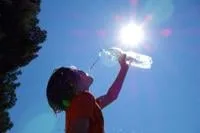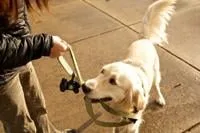Extreme heat and triple digit temperatures are expected in the Denver metro area Monday.
The city is providing cooling centers and offering tips to help residents stay cool and avoid injury during the heat wave, the Denver Public Health & Environment announced Sunday.
With a forecast of 100 degrees, Denver Parks and Recreation will open all currently operating recreation centers to the public as cooling stations during regular business hours with fee-free access.
Additionally, Denver Public Library locations (with the exception of Blair-Caldwell African American Research Library and Westwood Branch Library) are available as an indoor reprieve from the heat. For information about library hours visit: denverlibrary.org/locations.
High temperatures can cause illness, as excessive heat can increase your body’s core temperature. According to the Centers for Disease Control and Prevention , a heat illness happens when your body is unable to dissipate heat effectively.
Personal factors, like age, obesity, dehydration, heart disease, poor circulation, sunburn, and prescription drug and alcohol use can all play a role in your body’s ability to cool off during hot weather.

REUTERS/Loren Elliott/File Photo
Those who are at highest risk for heat-related illness include people 65 and older, children younger than two, and people with chronic diseases or mental illness.
During extremely hot temperatures, DPHE offers these tips to prevent heat-related illness:
- Stay inside in air-conditioned buildings as much as possible. Air conditioning is the No. 1 way to protect yourself against heat-related illness. If your home is not air conditioned, visit one of Denver’s cooling stations.
- Drink more water than usual and don’t wait until you’re thirsty to drink.
- Fans will not prevent heat-related illness in extreme heat, instead take cool showers or baths to cool down.
- Don’t use the stove or oven to cook—it will make you and your house hotter.
- Don’t drink alcohol or beverages that contain caffeine.
- Limit your outdoor activity, especially during the middle of the day when the sun is hottest.

REUTERS/Adrees Latif
If you must be outside during the heat of the day, follow these tips:
- Wear and frequently reapply sunscreen.
- Pace your activity and rest often.
- Pay attention to muscle cramping, which may be an early sign of heat-related illness. To combat cramping and heat-related illnesses, drink more water than usual.
- Wear loose, lightweight, light-colored clothing and a hat.
Heat illness, including heat stroke, can be dangerous and even fatal if not treated appropriately. Symptoms of heat-related illness can include: red or itchy skin, muscle pain or cramps, shallow breathing, elevated body temperature, a weak but quick pulse, nausea or vomiting and diarrhea, dizziness or fainting.
During periods of extreme heat, check on friends and neighbors to be sure they are safe and remember to never leave children or animals unattended in a car.
Street outreach teams are cautioning the homelessness about heat illness and providing referrals to shelters and cooling centers.
Denver’s network of shelters provides a setting where the homelessness can seek refuge from severe weather while getting connected to case management and other stability services. For more information on overnight and day shelters for individuals and families, visit the Department of Housing Stability’s Find Shelter webpage.
Keep animals safe from the heat
Pets can suffer heat stroke and suffer permanent harm if not cared for.
If you suspect an animal is suffering heatstroke:
- Move the animal to shade or a cooler area.
- Cool the pet down with water or ice packs on the stomach only.
- Offer cool drinking water, but do not force-feed it.
- Don’t dunk the pet in water. This can hurt them even more when their temperature regulation is impaired.
- Don’t cover, crate, or confine the animal.
Even if your pet responds to cooling treatments, it’s critical your pet sees an emergency veterinarian to see if it has suffered irreversible damage.

7. Spend a Day at Promenade Shops at Briargate
Shop with your dog at the pet-friendly lifestyle shopping center at Promenade Shops at Briargate in Colorado Springs. This destination was voted “Best Place to Shop with Your Pet” by The Colorado Springs Gazette. The Promenade Shops post “Pets Welcome” stickers to let owners know which stores and restaurants their dog can walk into as well. Water bowls and pet waste stations are offered throughout the property.
Photo Credit: Greg Bethmann (iStock).
Denver Animal Protection reminds residents to never leave their pets alone in vehicles, even for a few minutes. Temperatures inside a vehicle in the sun, even with windows down several inches, can rapidly rise to fatal levels for pets.
If you see a dog in a hot car, immediately call 311 or the Denver Police non-emergency number, 720-913-2000. You should also familiarize yourself with the city’s Good Samaritan law which provides legal immunity to people who break a car window to save an animal. However, to ensure immunity:
- You must believe the animal is in imminent danger of death or serious bodily injury.
- The vehicle must be locked.
- You must make a ‘reasonable effort’ to find the vehicle’s owner.
- You must contact the Denver Police Department, Denver Fire or DAP before entering the vehicle.
- You cannot use more force than necessary to free the animal.
- If you break a window, you must remain with the animal and on scene until police or DAP officers arrive.







